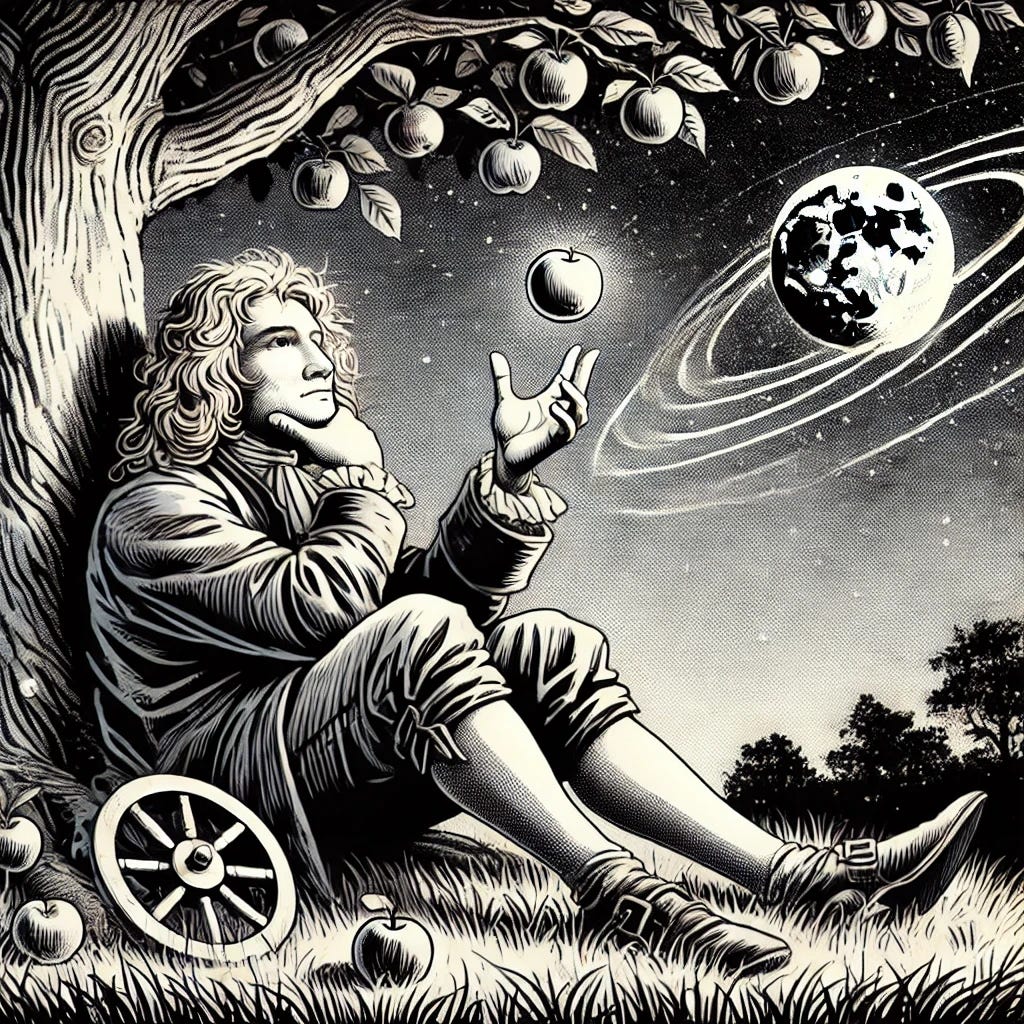Sir Isaac sat and contemplated the very nature of reality, just as those ancient philosophers all those centuries earlier had done. Just like Aristotle.
Aristotle’s view of how gravity worked hadn’t exactly gone unchallenged over the years, with Galileo in particular showing that big and small objects alike fell at the same speed during the 16th century. Even still, the idea that objects would fall to their natural resting place, whatever that was, explained the objects in the heavens, which seemed to stay in their respective place instead of falling to earth.
Newton was wildly curious about all of these things, especially the spots where the conventional wisdom was challenged. All he really needed to unlock these mysteries was a little time to himself.
“Never let a good crisis go to waste” might be a bit callous at times, but it seems appropriate to describe what happened when the Great Plague hit London in 1665. Many of us today can relate to suddenly having seemingly endless amounts of time every day.
That’s what was going on when Sir Isaac was sitting down underneath that old apple tree, contemplating why the Moon didn’t simply fall down to the planet, when the universe sent him the most incredible and ironic gift. An apple fell from the tree, hitting him in the head!
Suddenly, in a flash of brilliance, Isaac understood that the Moon and the apple were actually caused by the exact same phenomenon, which came to be known as Newton’s Universal Theory of Gravitation.
This is an inspiring story that leaves you in awe of moments of inspiration through serendipitous events. This type of story tells you that divine inspiration sparks in an instant, and that’s how genius works, and how good ideas get out into the world.
It’s all nonsense, and it’s honestly pretty insulting to the powerful intellectual process that was going on during that annus mirabilis—miracle year. No apple fell on Newton’s head, connecting celestial objects to terrestrial ones for the first time. Instead, lots of deep, quiet thinking and hard work went into this understanding.
Newton thought hard about the cutting edge technologies of his day. One of these technologies was ballistics and armaments, which were quickly becoming a decisive force in armed struggles all over the world by the time of the Great Plague.
He visualized a cannonball being fired from a powerful cannon from the tallest mountaintop around. This cannon would go much further before landing because of this high position, but Newton wondered what would happen if you kept adding power to the initial blast.
The first cannonball might go a certain distance, and adding more power would clearly make it go further before falling. Newton understood that the shape the cannonball made was a parabola, so it would go up and down in a predictable manner, like so:
Oops, sorry. Like so:
Newton grasped something incredible with this thought experiment. He saw that if the ball was shot far enough, the amount that it fell (the right half of the graph above) would simply overshoot the curvature of the planet. In other words, the ball would simply orbit the Earth perpetually.
Newton instantly understood that this was what the Moon was doing.
That moment must have been something to experience. Even though lots of intense thinking and plenty of standing on the shoulders of giants went into this, there was still one single individual moment of connection for Sir Isaac, where he fully grasped that the same forces that governed cannonballs also governed our Moon… and everything else out there.
In retrospect, it might seem fairly obvious. If that apple that didn’t fall on Sir Isaac’s head had been a snake, it would have bitten him. And yet, dogmatic thought pervaded in even the most open institutions of learning at the time.
Aristotle wasn’t worshipped as a god, but he might as well have been. An utterly brilliant polymath in his own right, he set the stage for the next two thousand years to come by laying out proto-scientific principles based on deductive reasoning. His powerful mind awed people for centuries to come, and the attitude was that nobody would ever do any better.
It’s really hard for me to explain how world-shattering Sir Isaac’s proclamation was during this incredible year of isolation for him, and it wasn’t even the only titanic innovation. He also found time to invent calculus and developed a working theory to describe how light worked.
It’s also tough for me to explain how much this turned the world upside down. While Francis Bacon is often called the father of science, it was Newton who really brought Aristotle’s house of cards toppling down.
There have been other enormous leaps in our understanding like this, where lots of hard work and patient thinking (and giants’ shoulders) go into a flash of brilliance, where a discovery or invention or idea changes the world forever. Can you think of any others that come to mind, where the world was dramatically different after someone toppled an old regime of ideas like this?





Thomas Kuhn talks about how hard it is to overcome previous paradigms. Newtons physics became a bit of their own and Einstein faced a lot of push back with relativity.
The apple story is the only thing most people know about Newton, and it's fake?